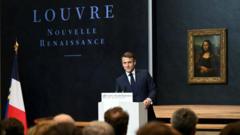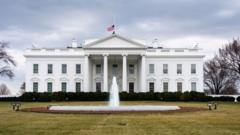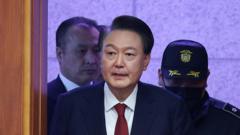As France approaches the new year, Prime Minister Michel Barnier's leadership is under intense scrutiny with a no-confidence vote set to take place, potentially signaling a constitutional crisis.
France's Political Showdown: Barnier Faces No-Confidence Vote

France's Political Showdown: Barnier Faces No-Confidence Vote
Prime Minister Michel Barnier's position hangs in the balance as a no-confidence vote looms, risking government instability and budget uncertainty.
The political landscape in France has become increasingly turbulent as Prime Minister Michel Barnier prepares to confront a no-confidence vote in Parliament, scheduled for Wednesday. If successful, this vote could force his resignation, plunging the nation into uncertainty regarding both its government and budget as the new year approaches.
While some analysts fear that this situation may mimic an American-style government shutdown—characterized by unpaid civil servants and stalled departmental funding—the reality is that France's Constitution has mechanisms to maintain governmental continuity, even in the event of a vacuum created by the absence of a budget or a functioning executive.
However, the financial implications are already visible. Investors are reacting to the political turmoil by offloading French stocks and bonds, which raises borrowing costs and poses a further economic challenge.
The situation stems from Barnier's surprising appointment in September by President Emmanuel Macron, who chose to overlook the disappointing electoral outcome for his own party. Instead of selecting a leader from the leftist coalition—who garnered the most votes—he appointed Barnier, a traditional centrist. This decision sparked outrage among the leftist coalition, further exacerbating political tensions.
Since assuming office, Barnier has faced the daunting task of governing from Matignon Palace, a term used to describe the tribulations associated with the prime minister's office where authority is limited. The political climate remains volatile as France looks ahead with uncertainty.
While some analysts fear that this situation may mimic an American-style government shutdown—characterized by unpaid civil servants and stalled departmental funding—the reality is that France's Constitution has mechanisms to maintain governmental continuity, even in the event of a vacuum created by the absence of a budget or a functioning executive.
However, the financial implications are already visible. Investors are reacting to the political turmoil by offloading French stocks and bonds, which raises borrowing costs and poses a further economic challenge.
The situation stems from Barnier's surprising appointment in September by President Emmanuel Macron, who chose to overlook the disappointing electoral outcome for his own party. Instead of selecting a leader from the leftist coalition—who garnered the most votes—he appointed Barnier, a traditional centrist. This decision sparked outrage among the leftist coalition, further exacerbating political tensions.
Since assuming office, Barnier has faced the daunting task of governing from Matignon Palace, a term used to describe the tribulations associated with the prime minister's office where authority is limited. The political climate remains volatile as France looks ahead with uncertainty.






















